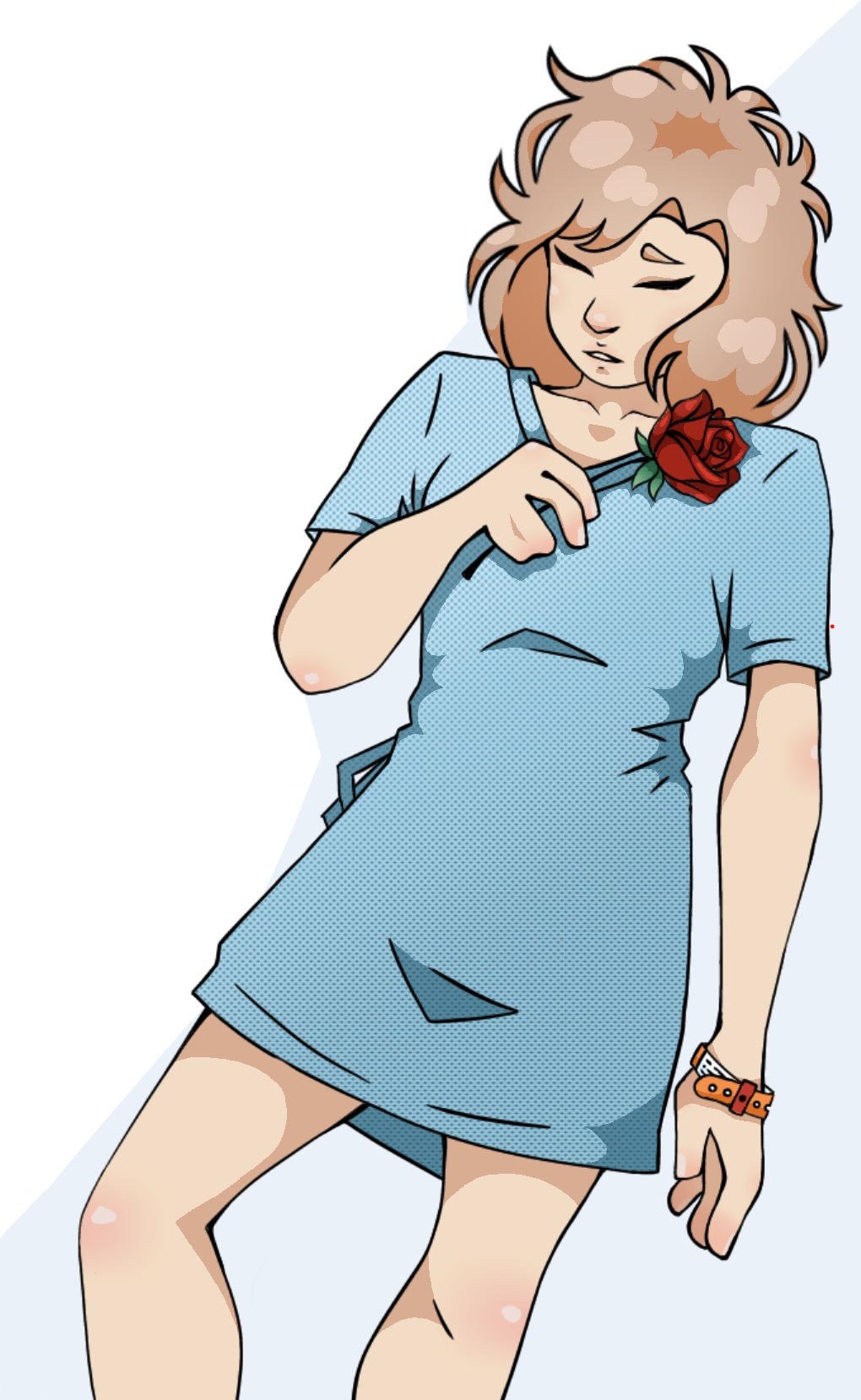Songbird’s Love Passed On
Theme: Jesus’ ultimate work of Love during Holy Week cascades outward. This story starts with imagery from The Nightingale and the Rose, but puts this imagery to work for a very different purpose than the original author did (Oscar Wilde). The image below is the young mother in the hospital wearing a hospital gown while holding a rose. This image was created by Ayrin, age 14.
The young mother could barely breathe after being infected with the virus that caused the pandemic.
Her husband quickly transported her to the hospital in his horse-drawn wagon, but neither he nor their young son could visit her there as the virus spread so easily and was so deadly. So, the young father worked hard all day everyday at the nearby mill and worried all night every night at their stone cottage. Consequently, he did not have much time or energy to tend to his young son. The neighbor watched over the young boy during the day, but not very closely. The young boy played all by himself everyday in the garden behind the boy’s stone cottage.
The little boy ran free through the hedges, rose bushes, and around the pond of the garden as the birds and rabbits kept an eye on him as best they could. He prayed often for his mother and missed her kisses and smell and the fullness of her long dresses when he tried to hug her knees. He would get lost in her dresses like he was trying to move through a heavy theater curtain.
Even though she was not around now, he still felt that she was watching over him, although a songbird flying overhead was the one that was actually watching over him most of the time. The young son did his best to get along without her, with the main exception that his play clothes were so much dirtier and his hair was so unkempt without the spittle on her soft hand to brush it lovingly into order.
Despite his young years, he distinctly knew he would see her again either in the garden of their stone cottage or the Garden of Paradise. He prayed for it to be this garden, but based on the hushed tones of his father speaking to neighbors, maybe it would only be in the Garden. The boy’s innocent mind suddenly jumped to a lovely idea.
“I want to give mother a red rose,” the boy said. “That will certainly heal her.”
The garden animals believed everything the little boy said, for he was so much bigger than they were that he must be filled with much wisdom and knowledge beyond theirs.
The songbird urgently took off to question the rose bushes about their growing seasons.
"It is not the time of year for roses to grow,” chimed all the bushes.
But the red rose bush knew a bit more than the other-colored bushes and said, “There is a way to get a red rose. But it will cost you everything.”
The songbird said, “I love that boy so much that I will do anything you say.”
“We will see about that,” the red rose bush responded for she had seen others back away after learning the details.
“Press a thorn from one of my branches against your feathery breast,” the rose bush instructed. “And sing a beautiful song.”
It was a surprise to the bush, but the songbird did exactly that. The garden was filled with a delightful song. A single white rose bloomed from the tip of the branch.
"That was a bit uncomfortable but easy enough,” the songbird declared.
“Oh, we are only just beginning,” the bush replied. “To get a red rose, you must press harder against the thorn and sing even more beautifully.”
“But that was the most beautiful song I know,” the songbird said. “Wait, I have recently heard a wonderful song from a neighboring garden.” She pressed harder against the thorn and a big wave of pain went through her small body. She sang the new song very skillfully and soulfully.
The white rose gradually turned pink.
“We are getting closer,” the bush reported. “But you must press even harder and sing even more beautifully.”
“I don’t know any other beautiful songs,” pondered the songbird. “I will just turn my pain into a new beautiful song.”
The songbird leaned even harder against the thorn. Her wings flailed from the pain, the thorn pierced her heart, and her song became wild. The sound she now made was eerie and haunting—but somehow the song was more beautiful than anything she had ever produced. All the garden animals and plants were so entranced by this sound that they could do nothing else but keep perfectly still and listen. Even the wind was completely motionless.
The rose gradually turned red and then the songbird fell dead upon the ground.
The next morning, as usual, the little boy came running through the garden. He stopped suddenly when he saw a single red rose standing above the bushes amidst the surrounding barrenness.
He carefully bent the branch down to reach the rose, but stuck several stubby little fingers upon the thorns. He broke off the red rose from the branch so it only had a few-inch stem. He then noticed the dead songbird on the ground and carefully wrapped her in his handkerchief. He placed her in a gap between the stones in the garden’s stone fence.
“Papa! Papa!” the little boy yelled as he ran to the nearby mill. “Look what I have! Bring this red rose to Mama and I am sure it will make her well.”
His father’s eyes welled up with tears as he thought of how little he had told the boy; but even still, the little boy, all by himself, came up with his own idea for his mother’s cure. The father took the red rose to the hospital late that afternoon and asked the nurse covered by a special suit and mask to take the rose from their son to his mother.
The nurse added her own special touch and pinned the rose to the mother’s hospital gown as if it were a corsage. Through her labored breathing, the mother amazingly began to hum the songbird’s first song. Later that night, the same nurse unpinned the corsage and placed the rose on the side table in a little saucer of water to keep it fresh.
The next day, during a moment of clarity, the mother asked for a single petal from the rose. She pressed the rose petal against her heart and stayed in that posture the entire day while she thought of her little boy, God, and her husband.
The next morning, she returned the petal to the nurse and asked for a fresh red petal to hold against her heart. During the day, she occasionally hummed the songbird’s first song through halting breath. Everyday, she repeated the request for a fresh petal to press against her heart and, at intervals, serenaded this posture with the humming of the songbird’s first song.
The days passed. The father worked hard. The little boy played intensely in the garden and checked everyday on the dead songbird, who was still wrapped in a handkerchief in the crevice among several stones in the wall. The mother had little change in her condition; but, at some point, she started humming the second of the songbird’s songs as she continued to use one petal a day from the red rose.
As the days passed, the petals from the saucer of water became more warped on their edges and dull in their color. The songbird’s feathers looked more and more shabby. With little change in her condition and just three petals left on the rose, the mother remarkably began humming the third and final, wild and eerie song of the songbird.
On the day of the final petal, the mother’s condition worsened. With very little strength left, she pressed the final petal against her heart. The nurses and doctors gathered around her bed. With what little breath she had left, the young mother used it to hum the wild and mysterious tune. She hummed it as loud as her breath would allow.
Suddenly, her singing stopped. The worried nurses and doctors examined the mother’s vitals. There was a sustained silence and stillness in the center of all the medical activity.
But then, her breathing returned! It became stronger, as did her heart beat. After an examination by a doctor, the nurse who brought her the red rose reached in the drawer of the side table and joyously flung all the old petals into the air.
The father came after work and heard the good news! Perhaps another week and the mother would be strong enough to come home to the cottage. The father rushed home to hug and tell his young son. The son had not seen the mother in many weeks and described trouble remembering her face but had no trouble remembering her voice.
The son ran out into the garden and his lighthearted energy revealed the good news to all of the garden’s residents.
The little boy ran over to the stone where the songbird was entombed. It was no longer there! The handkerchief was folded and still in the gap between the stones, but the songbird was nowhere to be seen. The little boy looked around. He began to cry because he wanted to thank the dead bird. A fox or other animal must have taken her.
Just then, the little boy heard something. He looked up through tear-filled eyes and saw a shape perched high in a tree branch. Wiping his eyes to clear his vision, he saw a songbird, but he did not recognize its song. It was a new song; more beautiful than any birdsong he had ever heard in the garden.
The little boy’s head told him that it must be a different songbird. But his heart told him that it was the same songbird, only different somehow. The little boy joyfully ran around at high speed following this songbird as it flew about the garden landing in one place and then another, while always singing its new song.
At the end of the week, while trying to keep up to the movements of the songbird, the little boy heard the songbird’s new song coming from near the stone cottage. He raced there to see his mother whistling the new song. He ran to get lost in her dress as he hugged her knees. She lifted him to her kiss. Her smell was so beautiful. The spittle on her soft hand that brushed his wild locks was so beautiful. Everything was so beautiful, like it used to be. But also in a new way.

